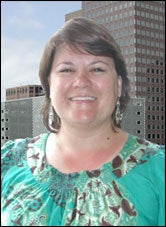Guest column: Promoting intellectual diversity is responsibility of entire CU community
Among the slate of 12 Guiding Principles of the University of Colorado approved at the Feb. 11 meeting of the Board of Regents was one that pertains to promoting diversity across the university. The language of that particular principle:
"Promote faculty, student and staff diversity to ensure the rich interchange of ideas in the pursuit of truth and learning, including diversity of political, geographic, cultural, intellectual and philosophical perspectives."
Amendments to these principles were proposed at the regents' April 22 meeting, including a recommendation from Regent Jim Geddes that the diversity principle be refined to focus responsibility for promoting intellectual, political and philosophical diversity to the university's faculty. The proposed draft of the amended diversity principle is:
"Promote faculty, student and staff diversity to ensure the rich interchange of ideas in the pursuit of truth and learning, SPECIFICALLY including FACULTY diversity of political, [omit: GEOGRAPHIC, CULTURAL,] intellectual and philosophical perspectives." (Emphasis added.)
To clarify the rationale behind this proposed amendment, Regent Geddes wrote a guest column that appeared in the (May 5 issue of the) CU Faculty and Staff Newsletter. Regent Geddes addressed several specific concerns about whether or not it is relevant or appropriate for faculty to actively address these matters in an educational environment. The points he raised were pertinent, and his answers were reasonable, within this context.
However, his column did not address a more fundamental concern: Why is it necessary to direct the primary responsibilities of upholding this guiding principle toward faculty?
Should faculty members have an active role in promoting intellectual, political and philosophical diversity? Absolutely.
Is this responsibility limited to our faculty members? Absolutely not.
The diversity principle, in the form currently adopted by the Board of Regents, is stronger without directing its focus toward faculty and without removing the components of geographic and cultural diversity. The primary function of a "Guiding Principle" should be to set a clear and broad goal, which can be focused by regent laws and policies and further refined through university and campus policies.
Promoting diversity in all forms should be the responsibility of faculty, students and staff across the university. Whether this may take the form of a professor leading a discussion that involves politically charged subject matter, or a group of students bringing topics out of the classroom to examine and knock around with others, or staff members debating legislative topics during their breaks, all members of the university share equal responsibility for ensuring that such discourse is respectful and inclusive.
Many of us are part of the University of Colorado because we expect and appreciate the opportunity to challenge ourselves and expand our understanding by being open to the ideas, perspectives and revelations that flourish within this great institution. In order for philosophical, political or intellectual diversity to thrive, all members of the CU community must share the directive to promote such activities.
On this basis, the University of Colorado Staff Council is opposed to the amendment proposed by Regent Geddes, and will present that viewpoint to the Board of Regents during their business meeting June 24-25.
Lori Krug is a classified staff employee in CU system administration and is chair of the University of Colorado Staff Council (UCSC). She earned her bachelor's degree in business administration from CU-Boulder. The above views have been endorsed by the representative members of UCSC, and reflect the opinions of a majority of university staff who responded to a recent survey. More staff survey responses on this topic may be submitted tohttp://www.surveymonkey.com/s/YKBHNYT and will be presented to the Board of Regents at its June 24-25 meeting.


